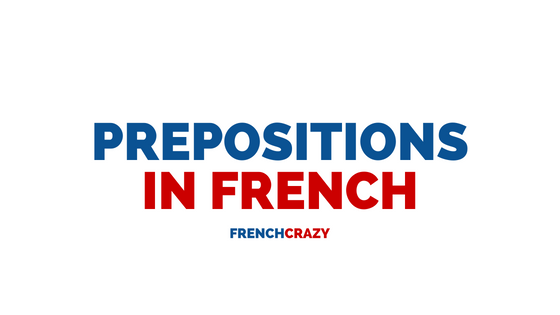Dear reader: this article on French prepositions was originally published on January 29, 2013. However it has since been updated and reviewed on July 18th, 2018. Enjoy!

French prepositions can be tricky for language learners. This is primarily because French likes to add or retain prepositions in places where the English language would typically omit them.
Do you know when to use à, de, en, par, pour, sur OR dans in a sentence?
This article will discuss situations in which you would use certain French prepositions. Don’t worry, I have plenty of example sentences and phrases. Plus at the bottom of the page I provided a small practice exam where you can test your newly acquired knowledge!
But first, what is a preposition? A preposition is a word that is used to indicate the temporal, spatial or logical relationship of its object to the rest of the sentence.
The French Preposition À
The French preposition à is used very often. It is typically translated as “to” or “at” in English.
Here are some examples for when we would use the French preposition à :
When talking about places:
Je suis à Paris / à l’école. Je vais à Paris / à l’école.
I am at Paris / at school. I’m going to Paris / to school.
When describing time:
J’ai un rendez-vous à 8 heures / à midi.
I have a meeting at 8 / at noon.
When talking about specific usage or purpose of an object:
Une tasse à café / une brosse à dents
A coffee cup / a tooth brush (think of brush for your teeth)
When talking about ingredients or the composition of food:
Une soupe à l’onion / une pizza au fromage
An onion soup / a cheese pizza
Wanna know more about this? Check out this specific Ask John question.
When talking about price or measurements:
Les fraises sont à 5 euros. On calcule le prix au kilo.
The strawberries are at 5 euros. We’ll calculate the price per kilo.
When making comparisons:
Supérieur à / inférieur à / égal à / semblable à
Superior to / inferior to / equal to / similar to
When describing who you’re communicating with:
Elle parle à ses amis. Il téléphone à sa mère.
She speaks to her friends. He calls his mother.
The French Preposition De
The French preposition de has usage which is very similar to English. This preposition directly translates to “of” or “from.”
When talking about a place of origin:
Elle vient de Paris / de France / du Brésil.
She comes from Paris / from France / from Brazil.
When discussing ownership of an item:
Le livre de l’élève / le chien du voisin
The book of the student (the student’s book) / the dog of the neighbor (the neighbor’s dog)
When categorizing an object:
Un livre de français / un cours d’histoire
A french book / a history course
When talking about the material an item is made of:
Une robe de laine / une table de marbre
A wool dress / a marble table
When discussing the contents of an object or what it is holding:
Une tasse de café / un verre de bière
A cup of coffee / a glass of beer
Pay Attention!
Manner of action:
Pleurer de joie / trembler de peur
Weep with joy / tremble with fear (cower)
When making certain comparisons:
Plus de / moins de / différent de
More of / less of / differ from
The French Preposition En
The French preposition en could mean “in,” “by,” or “from.” En is also an adverbial pronoun.
When discussing places:
Vivre en France / aller en Afrique
To live in France / to go to Africa
Forms of transportation:
Voyager en voiture / en train / en avion
Travel by car / by train / by plane
When discussing the duration of events:
(se) Terminer en deux minutes
To end in two minutes
When talking about certain materials:
Une robe en laine / une table en marble
A wool robe / a marble table
When talking about dress and clothing:
Être habillé(e) en noir / en jeans
To be dressed in black / wearing jeans
French Preposition Par
The French preposition par could mean “by,” “through,” or “per” in English:
When discussing passing through something or by something:
Nous passons par la porte.
We passed through the door.
Another example sentence could be… we passed by Nantes for a quick bite to eat.
To discuss agency or who performed the action:
Ils ont arrêtés par la police
They were stopped by the police.
To discuss the means of arrival:
J’envoie la lettre par avion.
I’m sending the letter by plane.
The manner in which an action was performed:
Elle prend son enfant par la main.
She takes her child by the hand.
To discuss the frequency of an event or action (very common):
Je pars une fois par mois / par semaine / par an.
I leave once per month / per week / per year.
The French Preposition Pour
The French preposition pour primarily signifies “for” but also has some other meanings.
When talking about final destinations:
Sandra part pour les États-Unis.
Sandra is leaving for the United States.
When discussing a goal or purpose:
Il l’appelle pour un rendez-vous.
He’s calling her for a date.
C’est la cuillère pour votre soupe.
It’s the spoon for your soup.
When talking about a known duration of events:
J’y vais pour une heure.
I’m going there for an hour.
When talking percentages:
Cinq pour cent des gens sont obèses.
Five percent of the guys are obese.
When discussion who something is for:
Le cadeau est pour moi!
The gift is for me!
French Preposition Sur
The French preposition sur translates to “on.” When I say on, I mean, the object is on top of something, about a topic, or out of a whole. Confused? Look at our examples:
When talking about being on the surface of some object:
Elle écrit sur son cahier à spirales. Le prof lit sur un écran.
She writes in (on) her spiral notebook. The professor reads from a screen.
Attention!
When discussing the subject of a film or work:
J’ai vu un film sur la Mafia.
I watched a film about the Mafia.
When talking about mathematical proportions:
Huit élèves sur dix ont réussi à l’examen.
Eight students out of ten had passed the test.
The French Preposition Dans
In French, dans is used to replace the English preposition “in.”
When describing being in a certain space or location:
Je marche dans la rue. Les gens qui habitent dans les rues.
I walk in the street. The people who live on the streets.
To talk about an upcoming date:
Nous partirons dans une semaine.
We will leave in a week.
Short Practice Exam
Unfortunately this is all in French, but if you have the level necessary – have a go at it! Fill in the following blanks with the appropriate French prepositions.
Il était une fois, j’étais _____ Paris. J’avais un rendez-vous avec mon amie, Sandrine, _____ dix-sept heures ____ soir ____ café. J’ai acheté quelque chose spéciale ____ elle, un collier ____ perles. Elle est arrivée ____ taxi. Elle était habillée ____ robe. J’ai commandé deux salades et nous avions une conversation ____ la vie quotidienne. Après notre repas, nous avons marché ____ la rue, main ____ la main. C’était une nuit incroyable.
Answers: à, à, du, au, pour, de, par, en, sur, dans, dans.
Conclusion
I hope this article conveniently summarized when to use certain French prepositions. This is certainly a challenging topic and your skills with prepositions can only improve by using more of your French and listening to more native speakers.
Any comments can be left below without any special subscription required!
If you would like a way to practice your French prepositions with ease, consider trying Frantastique for a month. They email you daily French lessons right to your inbox.



merci pour votre aide………
Superb et simple, merci beaucoup
De rien Keith!
Merci POUR votre aide!!